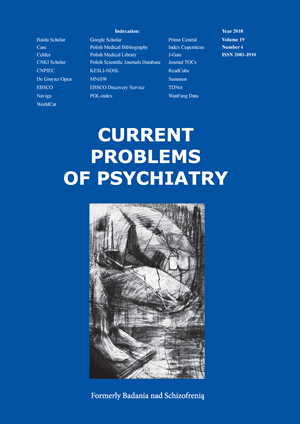Interwencje pozytywne w terapii osób chorych na schizofrenię
DOI:
https://doi.org/10.2478/cpp-2018-0018Słowa kluczowe:
psychoterapia pozytywna, metody, schizofreniaAbstrakt
Psychologia pozytywna swoje zainteresowania badawcze kieruje przede wszystkim w stronę osób zdrowych. Do najważniejszych jej celów należy między innymi budowanie pozytywnej postawy wobec siebie i otaczającego świata. Od niedawna psychologia pozytywna wytyczyła nowy obszar swoich zainteresowań badawczych i jest nim psychologia kliniczna. W ostatnich latach powstało kilka programów psychoterapii pozytywnej dla osób z doświadczeniem choroby psychicznej - schizofrenii. W artykule zaprezentowano najnowsze trendy w dziedzinie psychoterapii pozytywnej stosowane dotychczas w grupie osób chorych na schizofrenię, które wiążą się z uwzględnianiem różnic indywidualnych każdego pacjenta oraz specyfiki jego psychopatologii. Jeśli chodzi o stawiane cele terapeutyczne, istnieją dwa główne rodzaje interwencji: te, które skupiają się na strategiach intensyfikowania emocji pozytywnych i dobrostanu oraz metody mające na celu aktywowanie mocnych stron charakteru. Biorąc pod uwagę metody pracy terapeutycznej można je podzielić na metody treningowe lub te należące do nurtu psychoterapii behawioralno-poznawczych, a także takie, które uwzględniają różnorodne aspekty medytacji. W artykule przedstawiono podział programów terapeutycznych ze względu na zakres realizowanych celów terapeutycznych, wśród których najważniejsze są: intensyfikowanie przeżyć pozytywnych, budowanie mocnych stron charakteru i dobrostanu. Zaprezentowano programy terapeutyczne skupiające się nie tylko na przełamywaniu negatywnej postawy wobec własnej choroby i życia, ale także takie, które próbują pomóc zmierzyć się z nierozwiązywalnym problemem schizofrenii jakim są objawy negatywne.
Bibliografia
1. Wood AM, Maltby J, Gillett R, Linley PA, Joseph S. The role of gratitude in the development of social suport, stress and depression: two longitudinal studies. Journal of Research in Personality. 2008; 42: 854-871.
2. Pietrowsky R. Effects of positive psychology interventions in depressive patients? A randomized control study. Psychology. 2012; 3: 1067-1073.
3. Gilman R, Schumm JA, Chard KM. Hope as a change mechanism in the treatment of posttraumatic stress disorder. Psychological Trauma: Theory, Research, Practice and Policy. 2012; 4: 270-277.
4. Akhtar M, Boniwell I. Applying positive psychology to alcoholmisusing adolescents: A group interwention.Groupwork: An Interdisciplinary Journal for Working with Groups. 2010; 20: 6-31.
5. Murray G, Johnson SL. The clinical significance of creativity in bipolar disorder. Clinical Psychology Review. 2010; 30: 721-732.
6. Evans J. Positive psychology and brain injury rehabilitation. Brain Impairment. 2011; 12: 117-127.
7. Kashdan TB, Julian T, Merritt K, Uswatte G. Social anxiety and posttraumatic stress in combat veterans: Relations to well-being and character strengths. Behaviour Research and Therapy. 2006; 44: 561-583.
8. Al-Krenawi A, Elbedour S, Parsons JE, Onwuegbuzie A, Bart WM, Ferguson A. Trauma and war: Positive psychology/strengths approach. Arab Journal of Psychiatry. 2011; 22: 103-112.
9. Rashid T. Positive psychotherapy : A strength-based approach. The Journal of Positive Psychology. 2015; 10 (1): 25-40.
10. Fredrickson BL. The role of positive emotions in positive psychology: The broaden-and-build theory of positive emotions. American Psychologist. 2001; 56: 218-226.
11. Cohen S, Doyle WJ, Turner RB, Alper CM, Skoner DP. Emotional style and susceptibility to the common cold. Psychosomatic Medicine. 2003; 65: 652-657.
12. Fredrickson BL, Mancuso RA, Branigan C, Tugade MM. The undoing effect of positive emotions. Motivation & Emotion. 2000; 24: 237-258.
13. Meyer PS, Johnson DP, Parks A, Iwansky C, Penn DL. Positive living: a pilot study pf group positive psychotherapy for people with schizophrenia. The Journal of Positive Psychology. 2012; 7: 239-248.
14. Favrod J, Nguygen A, Franchauser C, Ismailaj C, Hasler JD, Ringuet A, Rexhais S, Bonsack H. Positive Emotions Program for Schizophrenia (PEPS): a pilot intervention to reduce anhedonia and apathy. BMC Psychiatry. 2015.
15. Nguyen A, Frobert L, McCluskey I, Golay P, Bonsack C and Favrod J (2016) Development of the Positive Emotions Program for Schizophrenia: An Intervention to Improve Pleasure and Motivation in Schizophrenia. Front. Psychiatry. 2016; 7(13): 1-9.
16. Vauth R, Stieglitz RD. Trening inteligencji emocjonalnej w schizofrenii. Warszawa: Wydawnictwo DK Media Poland; 2014.
17. Sims A, Barker C, Price C, Fornells-Ambrojo. Psychological impact of identifying character strengths in people with psychosis. Psychosis. 2015; 3: 7(2): 179-182.
18. Johnson DP, Penn DL, Fredrickson BL, Kring AM, Meyer PS, Lahnna I, Brantley M. A pilot study of loving-kindness meditation for negative symptoms of schizophrenia. Schizophrenia Research. 2011; 129: 137-140.
19. Johnson D P, PennDL, Fredrickson BL, Meyer PS, Kring AM, Brantley M. Loving – kindness meditation on enhance recovery from negative symptoms of schizophrenia. Journal of Clinical Psychology. 2009; 65: 499-509.
20. Schranc B, Bird V, Tylee A, Coggins T, Rashid T, Slade M. Conceptualising and measuring the well-being of people with psychosis: systematic review and narrative synthesis. Social Science & Medicine. 2013; 92: 9-21.
21. Schranc B, Riches S, Coggins T, Raschid T, Tylee A, Slade M. WELLFOCUS PPT- modified positive psychotherapy to improve well-being in psychosis: study protocol for a pilot randomised controlled trial. Trials. 2014; 15 (1): 203.
22. Schranc B, Riches S, Coggins T, Tylee A, Slade M. From objectivity to subjectivity: conceptualisation and measurement of well-being in mental health. Neuropsychiatry. 2013; 3: 525-534.
23. Leamy M, Bird V, Le Boutillier C, Williams J, Slade M. A conceptual framework for personal recovery in mental health: systematic review and narrative synthesis. British Journal of Psychiatry. 2011; 199: 445-452.
24. McNulty JK, Fincham FD. Beyond positive psychology? Toward a contextual view of psychological prosses and well-being. American Psychologist. 2012; 67: 101-110.
Pobrania
Opublikowane
Numer
Dział
Licencja
Prawa autorskie (c) 2018 Autorzy

Praca jest udostępniana na licencji Creative Commons Attribution-NonCommercial-NoDerivatives 3.0 Unported License.


